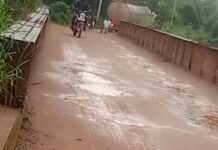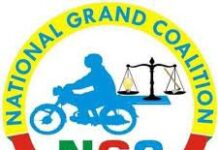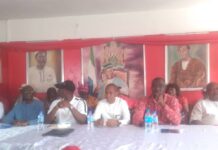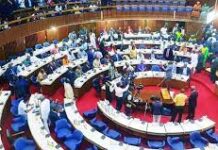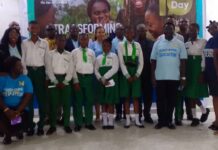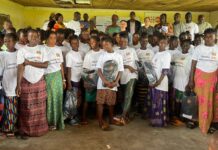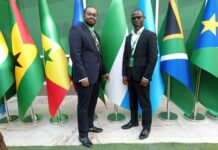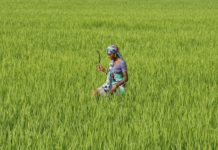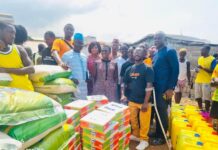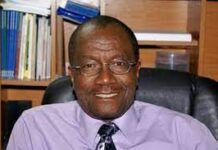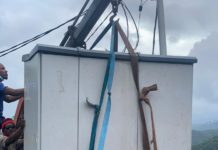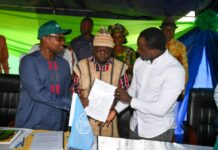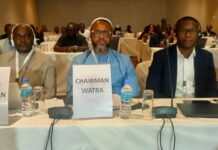The Acting Auditor General of the Republic of Sierra Leone, Abdul Aziz has, on Tuesday 5th July, 2022, paid a courtesy visit to the Anti-Corruption Commission (ACC).
In a meeting with the leadership of the ACC in the commission’s conference room, 3 Gloucester Street, Freetown, the Acting Auditor General outlined a range of issues that would strengthen and broaden the existing partnership and MoU between the two institutions.
Mr. Aziz emphasized on the importance of the partnership to the attainment of the mutually distinctive roles and mandates of the ACC-SL and Audit Service SL in the public sector accountability space.
He spoke on the communication challenges and the need for knowledge-sharing and collaboration.
In his submission, ACC Commissioner, Francis Ben Kaifala Esq. said he was pleased with the courtesy visit and underscored that it works well for Sierra Leone and Sierra Leoneans when ACC and Audit Service SL work in synergy. We impact society a lot and issues of accountability will be addressed seriously.
ACC boss thanked Audit Service SL for their support to the ACC and said they were doing a difficult job under difficult circumstances. ‘Ordinarily, people do not like Auditors” he said.
The ACC’s Deputy Commissioner, Augustine Foday Ngobie who chaired the meeting, described the visit as a good move and that it will definitely improve on the public’s perception of the relationship between the ACC and Audit Service SL, as we are complementing one another and not the other way round.
It was resolved that within one month, the existing MoU between the ACC and Audit Service SL, would be reviewed and upgraded to meet and address the emerging issues as they would relate to the effective partnership and collaborative work of the two institutions.
On the team from Audit Service SL were also members of the Senior Management Team and the Board Secretary, whilst the ACC also had the full representation of its Senior Management Team
National Monitoring & Evaluation Team Engages Paramount Chiefs
The National Monitoring and Evaluation Directorate has engaged Paramount Chiefs in Koinadugu District on Participatory Monitoring of community Development Projects.
The one day engagement was done at the Koinadugu District Council Hall which was attended by Paramount Chiefs from all the ten Chiefdoms in Koinadugu District.
During the workshop the discussion was based on how Paramount Chiefs should be involved in the Monitoring and Evaluation of all development projects implemented in the District.
It seeks to address issues of strategic Partnership with the National Council of Paramount Chiefs, provide an oversight function in tracking community service delivery, mapping community development projects and other important functions.
Welcoming participants and stakeholders, the Host Paramount Chief for Wara Wara Yagala Chiefdom, P.C. Gbawuru Mansaray the 3rd reiterated his unending support to monitor and evalute all projects implemented within his Chiefdom.
The P. C. Pledged his commitment in working with other stakeholders in ensuring PC’S active participation in community project monitoring and also further educate his subjects about the essence of the Monitoring process.
Speaking to Shalom Radio News, The Director General of the National Monitoring and Evaluation Directorate in the Office of the President, Dr. Edwin James said, the Directorate was established to ensure effective participation of Paramount Chiefs and other key stakeholders in Community projects monitoring.
He said the aim is to allow Paramount Chiefs to assess their projects monitoring strength, weaknesses, successes, challenges and the way forward to project implementation strategies in their respective Communities.
“Our Paramount Chiefs should be able to monitor all development projects like; building public toilets, water well, schools, bridges and other key infrastructural developments projects in their Chiefdoms and that’s exactly why they needed such trainings. Thankfully, they have all pledged to fully participate and we are looking forward to that” He Concluded.
Ex-President Koroma Jets to Zambia & Tanzania
Former President of Sierra Leone, Dr. Ernest Bai Koroma, has departed Freetown for Lusaka, Zambia. He will be attending the Advisory Board meeting of the Brenthurst Foundation scheduled for 14th to 16th July 2022.
The Brenthurst Foundation is a think tank with “a focus to attract the investment needed for continental regeneration and prosperity.” Therefore, President Koroma will join other leaders, diplomats, policy experts who make up the Advisory Board from across the continent, to continue deliberations on development and investment in Africa.
While in Zambia, the Foundation will pay a courtesy call on host President Hakainde Hichilema.
From Zambia, the former Sierra Leonean leader will proceed to Arusha, Tanzania. There, he will deliver the keynote address at the Africa Drive for Democracy Conference slated for the 20th to 22nd July 2022. Under the aegis of the Strategic Litigation, MS Training Center for Development Cooperation and the Institute Security Studies, the conference brings together participants from over thirty countries to renew commitments on the promotion of democracy viz a viz the guaranteeing of a safe space for democracy activists, as well as to share experiences on the trends on the rapid decline of democracy in Africa.
President Ernest Bai Koroma will be sharing his rich experience in building peace and democracy in Sierra Leone, as well as the ECOWAS sub region. As the organizers put it: “we would like your excellency to reflect on your experience in Sierra Leone and what lessons could be replicated in the continent. Based on these reflections, for your Excellency to discuss the role of civil society on the continent (notwithstanding all its limitations) in the democratization process
=TALKING POLITICS=
Proportional Representation – A Case for Greater Political Participation in Sierra Leone Politics
By Sulaiman Banja Tejan-Sie Esq
Today’s topical issues as we approach another election cycle in our growing democracy are the violent trend of our youth in parliamentary bye elections, political leaders’ complicity in that malaise, the challenges in our Courts and most importantly the ever – increasing threats that these anomalies pose to our nascent democracy.
The case for the President and the Electoral Commission Sierra Leone (ECSL) aka National Electoral Commission (NEC) to invoke section 38A of the Constitution of Sierra Leone (Amendment) Act No. 15 of 2001 is more compelling today than any other period since the 2002 Presidential and Parliamentary elections. Dr Julius Spencer’s brilliant elucidation of the merits of this not-so-novel electoral concept on the eve of the 60th anniversary of our country’s independence was as candid as it was both inspiring and eye opening.
Contrary to what the normally not-so-credible main opposition APC may want us to believe, Section 38A of the Constitution of Sierra Leone (Amendment) Act supra amended the 1991 Constitution Act No. 6 of 1991 by adding a new section 38A which established an alternative electoral system of electing Members of Parliament notably the district block representation system in a situation where “… a date for a general election of Members of Parliament has been appointed but constituencies have not been established in accordance with subsection (3) of section 38 for the purposes of such election,..” then in such a situation “.. the President may, after consultation with the Electoral Commission, direct that such election shall be conducted on the basis of the existing districts in a manner to be known as the district block representation system instead of constituencies.”
Subsection (3) of section 38 of the 1991 Constitution referred to above provides that “The boundaries of each constituency shall be such that the number of inhabitants thereof is as nearly equal to the population quota as is reasonably practicable:”, in addition to other factors that should be taken into consideration in the delineation of constituencies under the said 1991 Constitution. Quite recently, in a further bid to undermine the president’s authority to hold elections under a PR system on the advice of the Chief Electoral Commissioner if the situation so demands, the Parliamentary leader of the opposition APC quite recently, to the amazement of many told this nation that Section 38A which gives the President this unambiguous and unequivocal authority was in fact an entrenched clause which requires the acquiescence of the majority of the people in a referendum for it to have force of law.
Honourable Chernor Bah couldn’t have been more wrong and misleading. Section 38 is NOT an entrenched clause; it has been amended by the addition of Section 38A. The entrenched clauses in the Constitution are specified in Subsection 3 of section 108 as follows: Sections 46, 56, 72, 73, 74(2), 74(3). 84(2), 85, 87 105, 111 119, 120, 121, 122,123, 124, 128, 129, 131, 132,133,135,136,137,140,151,156 and 167; in addition to section 108 itself and the whole of Chapter III of the said Constitution.
It is an irrefutable fact that the constituency based “first past the post” electoral system, has in large measure helped perpetuate elections violence, especially during and after the 2007 General and Presidential elections. The reasons for this are as myriad as they are incontestable. By its very nature, the constituency-based election system requires the demarcation of a particular land mass called a constituency, and an ascertained aspirant called the candidate.
A scenario of this nature brings contesting aspirants and their supporters into a faceoff, and put them at daggers drawn as they are in direct contention for a seat in a particular locality. In a situation of this nature where stakes are high and emotions are at molten level, the constituency-based system creates a fertile breeding ground for political chicanery, subterfuge, intimidation and violence.
The constituency based electoral system also exacerbates ethnic tension as the various candidates are specific and discernible by both their looks, ethnic background and creed. This scenario could easily make them targets of intimidation and ethnic based violence or other forms of malfeasance. Such intimidation, chicanery and subterfuge are normally perpetrated by party stalwarts, amazingly under the watch of their political leaders, with resultant injuries and in some cases even death and the destruction of property.
Constituency based elections place an undue economic burden on our government’s lean treasury. The delimitation of boundaries into constituencies and the disaggregation of populations say in a district by constituencies require enormous material and human resources. Valuable resources as such can be better spent on various critical public services like health education and nutrition in a country as desperately poor and aid dependent like ours.
The proportional representation district bloc system for its part, greatly ameliorates the challenges that characterize the “first past the post” system. Since PR does not make provision for the delineation of districts into constituencies, valuable resources that would have been spent on such activity would be transferred to other needy sectors of the economy, and help in critically consolidating the nation’s poverty reduction strategy.
Furthermore, because the PR system does not make provision for demarcated and discernible constituencies and ascertained voting populations, the risk of faceoff confrontations between a particular candidate and his supporters with that of his opponent is greatly reduced. It involves each party drawing up a list of its candidates in order of preference in a district and the seats are then shared on the basis of the proportion of votes won by each party in that district.
The PR system further helps lessen ethnic tension as candidates are not ascertained, as a result, the chances of them being targeted for intimidation as a result of their creed and ethnicity is greatly reduced. Perhaps one of the finest benefits of the PR system is that it helps eliminate the idea of a bye-election in case of the death or incapacity of a sitting parliamentarian.
The elimination of bye – elections will not only nullify incidents of violence, it will also save the nation valuable resources that would have been spent on such an expensive enterprise. PR also helps bring into the country’s body politic skilled, educated and worthy Sierra Leoneans, who may not have the fortitude to handle the hassle, molestation, intimidation and violence that has come to mark our elections in recent times. Such endowed Sierra Leoneans will bring a breath of fresh air to the stale, adversarial, constituency-based politics of post-independence Sierra Leone.
The constituency-based system is elitist because it requires vast amounts of money to go through this tedious process, poorer but worthy Sierra Leoneans, will not have the opportunity to bring their critical skills to bear on the developmental aspirations of our country and our country can only be the poorer for that loss of valuable human capital.
For our women folk across the country, the proportional representation district block system will guarantee them a 30% quota in Parliament. This will help consolidate not only the empowerment of the opposite sex, but will greatly strengthen the inclusivity we have all yearned for in our national politics. Women make better economists and managers and so by consolidating their inclusion under the PR system, the exceptional and valuable skills they will bring into our politics and law making will only help fast track our national cohesion and development far more than the existing ‘first past the post’ system, which has continuously failed to live up to these aspirations in that regard.
For us older folks, we just have to reflect back on the quality of our parliament from 1996 to 2007 and the tranquil political atmosphere in those two electoral cycles to fully grasp and appreciate the virtues and urgent need for us to revert to an electoral system (proportional representation) that will save our lives and money, protect our properties and guarantee an effective legislature with gender equality and quality representation across the aisle.
Conclusion
In light of the foregoing, I am of the firm conviction that the PR system more than the constituency system is better equipped to lessen elections violence and intimidation, promote national cohesion, enhance quality representation, accelerate gender empowerment and inclusivity as a result of the fact that it is inherently inclusive i.e., it does not expose candidates to ethnic and/or religious based discrimination.
The PR system enhances quality representation as it helps increase women’s’ participation in national politics and creates the opportunity for better skilled Sierra Leoneans who may not afford the time and energy to participate in divisive and adversarial partisan politics. The PR system is economically viable as it saves money on boundary delimitation and fratricidal and normally violent bye elections.
For a poor and relatively unstable post war country, I am of the conviction that Sierra Leone cannot afford the divisive, economically burdensome and ethnic violence prone western style constituency-based elections
Uncertainty Is Now Certainty
By Mohamed Sankoh (One Drop)
The dictatorial tendencies always shown by the ruling Sierra Leone People’s Party (SLPP) on issues that border on the wellbeing and soul of the nation have now reached a stage of public disgust, no doubt about that. In fact, that revulsion is slowly fermenting into something toxic. And that toxic fermentation might, in the near future, brew a juice that would taste like the local “Bitter Kola” even in the mouths of the ruling elite.
Sierra Leone currently, as I noted in one of my One Dropian droppings early this year, could be likened to a drunken man sitting on a keg of dynamite, sleeping, while unguarded children are carelessly playing with matches and a jerry can of petrol around the disrepair wooden house. And when a Chief sits in the “court baray” and proclaims that he is more comfortable with the work ethics of his clan; then his toadies should not be angered, or frightened, if lesser villagers start talking casually about, or making sarcastic references to, those “work ethics”.
I have always held the view that if President Julius Maada Bio, with his SLPP, promised a “New Direction” in 2018; that “new” should not be looking older than the old. If they had promised to “plug the leakages” in Government’s spending; they should not be seen indiscriminately opening financial “Samba Gutters” like drunken sailors trying to woo the only harlot in a brothel. And if they had promised to do things differently than the erstwhile All People’s Congress (APC) government; they should not be seen doing the same things they had accused the APC of. Each time our Commander-in-Chief and his hangers-on make references to the APC to justify what they had done, or still doing; what comes to mind are those Pastors who claim to have formed their churches based on the New Testament but frequently remind their congregations about Leviticus 27:30-34, in the Old Testament, which talk about tithing!
As I always note, majority of Sierra Leoneans are today hungrier and angrier than they were four-and-half years ago. They have faced the most blatant human rights violations than they faced four-and-half years ago. They have seen naked attacks on the tenets of Democracy and the Rule of Law than they saw four-and-half years ago. They are now spectators to the seemingly fusion of the Executive and Judiciary into a sort of conspiratorial camaraderie that appear to be making mockery of either Montesquieu (“Espirit De Lois” translated as “the spirit of laws” in the English language) or John Locke’s theory of “Separation of Powers”! And majority of Sierra Leoneans are now witnessing the arrogant display of political power with crude uncouthness!
Yet, the “Drunkardnomists” and “Paopagandists” are cunningly trying to frighten us into a blazing silence by ramming down our throats the ramifications of any future political conflagration. They are quick to make references to the pre-Paul Kagame Rwanda but always shy away from honestly discussing the compositions of the Bio-administration and those of Government’s Agencies and Departments. My point is: if the Chief and his Council of Elders do not want lesser villagers to discuss the contours of the Chief’s body; he should not appear naked in the “court baray”. The funny thing about these ‘down-throats-rammers’ (another One Dropian word) is that they have been, desperately, trying to rewrite the past with an ink of deceit on a paper of chauvinistic arrogance!
And it is that chauvinistic arrogance that is insultingly insulting to the collective memory of sober-minded Sierra Leoneans. Six years ago, when the erstwhile APC government of Ernest Bai Koroma tried to interpret the “austerity measures”, taken at the time by his administration, through the telescope of “global shocks”; the SLPP “Drunkardnomists” made fun out of it and promised that if their party was given the chance in 2018 they would fix the country’s economy within six months. But now, due to reckless and headless spending coupled with a heavily pregnant Wage Bill, the “Paopagandists” want to convince us that “external factors” are solely responsible for the crippling of Sierra Leone’s economy.
Funnily, if the SLPP convinced its supporters six years ago that “global shocks” had nothing to do with the local economic state of affairs then; then why would they want us to now swallow hook, line and sinker their argument that “external factors” are responsible for the pretty mess in which Sierra Leone is currently in. How can the “Drunkardnomists” and “Paopagandists” reference “external factors” which are not reflecting on their own lifestyles, salaries, and other perks that go with presidential appointments? They cannot be having all the creature comforts, or live in clover, and want us the lesser mortals to mutely accept the “external factors” like sheep being led to the slaughter.
And what is certainly certain in Sierra Leone is the uncertainty of what tomorrow holds for ordinary Sierra Leoneans if the SLPP is still at the rudder. Now, both the Middle and Working Classes are feeling the consequences of the half-assed policies of the Bio-led administration. They are feeling the pinch of a directionless “New Direction” each time they buy a litre of fuel; every time they go to the markets; each time they pay their rents, and every time they buy top-ups for their electricity meters. Sierra Leone’s future, under the watchful watch of the SLPP, is bleakly bleak like the murky gutters at Kroo Bay in central Freetown.
But thankfully, Sierra Leone is not a nation of sheep that will allow itself to be led again to the abattoir by wolves in sheep’s wools. Once bitten in 2018; they would be twice shy in 2023. And the toxic fermentation, which the SLPP is now brewing, would taste like stale “Bitter Kola” in their mouths.
It is on that note that I will end today’s One Dropian dropping with a quote by Abraham Lincoln from a speech he delivered in Clinton, Illinois, in 1858. He had stated that: “You can fool all the people some of the time and some of the people all the time, but you cannot fool all the people all the time.” I know the SLPP “Drunkardnomists” and “Paopagandists” are not dead to language
=YOUTH WATCH=
Politics: Why Blame the Youth of Sierra Leone?
By Saidu Bangura
Ataya Base (Tea shop) in Freetown
A discussion of youths and/in politics is as controversial a topic as the allusion I have made in the title that youths are agency in politics. Agency as used in this context should be understood to mean “instrumental” given the role youths play or the roles they are made to play in politics. However, when we consider the question “can we blame the youths of Sierra Leone?”, two old but pertinent songs come to mind: Peter Tosh’s “Can’t Blame the Youths” and Musical Youth’s “The Youth of Today”. While both songs may not have been written to have any political undertones as we may want to imagine or interpret them, some aspects of the lyrics can be juxtaposed to give us an interesting reading in this article, especially as they pertain to how we should perceive youths in society or how they should perceive themselves.
Peter Tosh’s “Can’t Blame the Youths” opens with a strong but contentious caution “you can’t blame the youths; you can’t fool the youths” whereas Musical Youth’s “The Youth of Today” opens with a straightforward and categorical message: “don’t blame the youth … don’t take us for fools”. When we put both choruses into perspective, the songs seem to tell us the prevailing conditions of the youths in society have nothing to do with them, but what their polities want them to be or how their societies condition them to be. While I do not intend to critique both songs, I equally will not make any critical interpretations here. Rather, some aspects of the lyrics of the songs will be used to make my case in this article. To do so, I may have to pick a few things from the songs and see how they rhyme with the political reality of Sierra Leone and how the youths of our country are consequently impacted by the politics of the day.
For 61 years now, successive political parties and individual politicians in Sierra Leone have used the youths as agency to launch, promote and champion their political careers, and maintain their grip on political power and the consequent assault on our resources given the politicians’ easy access to the youths and the latter’s prompt willingness to propel the former to Parliament and State House. While the youths may not (have) be(en) aware of how politicians have been “robbing”, “raping”, “kidnapping” and “killing” their future (echoing Peter Tosh) even before the politicians assume their respective offices, and considering the continued and constant “brainwashing” of the youths in Sierra Leone by politicians, my goal in this article is to reflect on how the Sierra Leonean youths have been used, abused, misused, refused, un(der)represented, misrepresented and abandoned by the political parties and politicians in Sierra Leone for the latter’s selfish political gains and that of their associates.
Considering the sociopolitical and economic milieu in which the African youths were (are) born into, and raised, and consequently survive through, the Sierra Leonean youths inclusive, we learn in Jon Abbink’s article “Being Young in Africa: the politics of despair and renewal” that the African young (wo)man faces a lot of odds and challenges and has no control over her/his future. While some African countries may have made progress in areas such as education that leads to a gainful technical career pathway immediately after secondary school, youth entrepreneurship and employment opportunities for university graduates, access to improved health care facilities, access to a sustainable livelihood and housing for young families, and the creation and promotion of an enabling environment for private businesses to thrive, and, hence, the creation of jobs for the youths, can we say the same for Sierra Leone?
The continued economic challenges faced by the parents and older relatives of these young (wo)men who could have guided them into a profitable professional path, the unavailability of technical training facilities and institutions for these young people to learn trades that will lead them to becoming self-employed and self-sufficient, their permanently being relegated to unemployment and poverty taking into account the lack of production industries except the few extractive ones, their subsequent exclusion and marginalization from mainstream society unless when needed by rogue politicians, has made many youths to see prostitution as a way to survive, drug addiction as an escape route, the 24/7 laid-back spending time attitude mostly at Ataya Bases, and their relentless following of politicians and other “Big Men” for pittances to execute their political and other errands while they continue poor and destitute. Can this be a result of their hopelessness in laying their hands on something tangibly profitable or is it due to bad politics practiced by our politicians and the culture of dependency installed and maintained for decades?
Do we blame the youths, or do we blame the politicians for the predicament of the youths?
The answer to the above question takes us back to the words of the choruses of Peter Tosh’s song: “you can’t blame the youths; you can’t fool the youths” and that of Musical Youth’s “don’t blame the youth … don’t take us for fools”. Or can we (not)? The binary opposition in the words of the chorus of Peter Tosh’s song, “you can’t blame the youths” on the one hand, and “you can’t fool the youths” on the other, introduces us to the linguistic and political dialectics of where and on whom to cast the blame for the predicament of the youths: the fault is not theirs and you can’t make it theirs. Musical Youth’s no-nonsense direct message “don’t blame the youth … don’t take us for fools” is as clear as crystal: we are not responsible for our dilemma; we know where our problems emanate, and we know who to blame. Is it their fault or are they victims of the societies and political dispensations they were born, raised, and live in? Is it the politicians’ fault in not implementing programmes or creating opportunities that benefit the youths or are the youths not ambitious enough to task the politicians to deliver services that benefit the people, particularly the youths, the future of the nation, they govern?
While we may want to say politicians have been arrogating for themselves and their families and immediate allies all the resources of the state at the detriment of the entire nation, especially these vulnerable young (wo)men who are mostly used for electioneering purposes and abandoned immediately after that process, are the youths themselves not responsible for their conditions? The culture of dependency on the affluent cultivated and cared for by the politicians and other prominent citizens has made many people, especially the young (wo)men who are in the majority, not to be too concerned that time wasted is never regained or to aspire for a better future for themselves.
The instrumentalization of the youths by politicians due to the former’s socioeconomic vulnerability and their lack of a sustainable means of sustenance, livelihood, and economic engagement and independence, makes one wonder: why do people go into politics? Do they go into politics to serve the people and their communities and consequently the country as a whole or do they go into politics to serve themselves? The answer to these questions depends on where you find yourself, and probably how you perceive politics and political participation.
If the youths constitute agency in politics or are instrumental in the election of who govern them, then those who govern owe the youths a huge responsibility. On this note, Musical Youth’s resounding statement that “The youth of today has got lots to say/It’s our life, it’s our future/Because we’re living today/So don’t blame the youth” becomes so relevant for the youths of Sierra Leone as for the UK youths then that the song may have been made for.
Inasmuch as we may want to apportion blames on the youths for their plight in Sierra Leone, and much as we must encourage them to own their responsibilities, we must consider the following: (a) what existing national, regional, district, town, and community level programmes are there to remove our young (wo)men from their current socioeconomic predicament? (b) what is the income level of the older family members of these young (wo)men? (c) what is the educational level or what do the parents/guardians of these young (wo)men do? (d) where do these young (wo)men come from, where do they currently live and how do they earn their living? (e) are they in conflict with the law and if so which area(s)? (f) what do they aspire or want to do in life? and (g) how and where do they spend the day? These questions and many more like them should be on the minds of current and aspiring politicians if we are to build a nation that cares for its future. Today’s youths are tomorrow’s politicians, law enforcement officers, teachers, nurses, and other state functionaries.
As I have written in some other articles, our politicians are selfish. The politics of Sierra Leone is about them and their cronies and immediate family members. Our Parliament is a theatre of dramatic monologues and political party soliloquies. The problems of the country are not part of the order of their discussions. Our MPs are actors whose scripts contain bills that benefit only them and their political parties. There was no controversy over the Welfare Bill for Parliamentarians (Parliamentary Act 2022), which was for the benefit of the entire membership of Parliament, but for others that present political disadvantage or advantage to one side of the aisle or the other, the petulant bickering is unending (the case of the Proposed Public Elections Act 2022). The basic needs of the people are never discussed in parliament because they are very much unconcern about the future of the people they claim to represent, especially these young (wo)men that they instrumentalise before and during political campaigns, and consequently abandon them after elections, and whose aspirations and future are never discussed in parliament.
Until our politicians understand that one goes into politics to serve the country and its people and not to get rich, and to prepare the present generation to take after them irrespective of their socioeconomic background and political affiliations, the responsibility of our young (wo)men is on them. Until our politicians understand that they need to have tangible programmes that are executable so that today’s youths can be well prepared for tomorrow’s challenges, the future of our country is bleak. Until our politicians understand that siphoning off our resources for their personal benefits and that of their immediate families and cronies is a disservice and a threat to the sustainability and peace of Sierra Leone, these young (wo)men that are neglected today and whose future is not a concern, will be tomorrow’s aching challenges.
For the 2023 municipal and town council, parliamentary and presidential elections, I would love to see a serene but politically challenging and active youth; a youth that will tell the politicians to bring their children and other family members in their campaign trail; a youth that will ask politicians what programmes they have for their communities and the future of the nation, especially the future of their group – the youths; a youth that will refuse to accept drugs and alcoholic drinks, T-shirts and peanuts to campaign for people that will abandon them immediately after the results are announced; a vigilant youth that will discourage politicians from buying their way to political offices; a youth that will ask critical questions about how and why the country has been mis-governed for 61 years by two political parties, and how it will be governed for the next five years; a youth that will be more concerned about the future of the country, and less so about the religion and sex of the candidates, or the ethnolinguistic group and region a candidate hails from; a youth that will put the future of the country first, second, third, fourth and fifth and hence tell the politicians that the future of the country is at stake and it is their biggest concern; a youth that will not fight other youths for politicians or for political parties, but will engage themselves in civility and camaraderie as they challenge politicians for the future of Sierra Leone.



